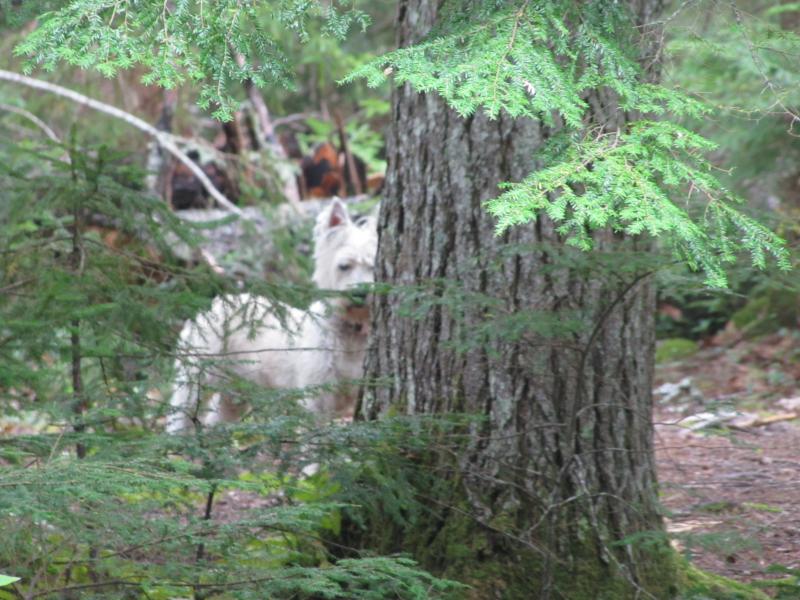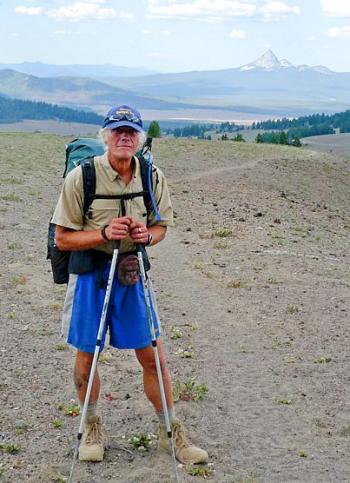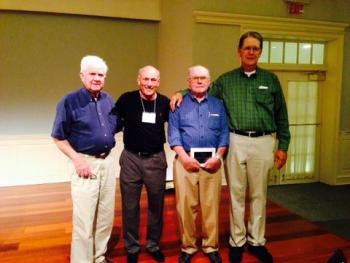This Week in Lincolnville: Summer winds down
I’m pretty sure you don’t want to hear this, but Summer 2015 is coming to an end. For one thing, it’s dark at 4 a.m. now; we’ve lost nearly an hour and a half of daylight since June. The tomatoes are ripening at a quickening pace, and zucchini wisecracks proliferate. A fellow at church yesterday (I won’t give his name to protect the poor guy) offered to take everyone’s humongous zucchini – sheer zucchini suicide – for the popular relish the church sells.
Our hens, worn out by their year-long egg laying marathon, have started moulting, and consequently production is down. Meanwhile, this year’s crop of pullets run circles around them, clear-eyed and clean-feathered; they’ve yet to lay their first egg and have no idea of what lies ahead. Something like I felt at 11. Not a clue.
The shore birds are moulting too. The beach is littered with the soft under-feathers of ducks and gulls, especially along the sea wall. I imagine they might hug the wall at night, sleeping against its warm, solid surface, protecting them from night attack, on one side anyway, though I don’t know what their enemies might be.
Like all jobs, being on the inside of the Beach trash gig has its perks. Wally has his, and I have mine. Just this morning (wait while I check my pockets) I found a tiny red car, barely an inch long, with wheels that turn, both halves of a snap-together green plastic ball (also tiny), and a small red ring that I’ll add to my stitch markers (a knitting thing). Wally’s aspirations are greater than this. As you might imagine, there are returnables in those trash cans of soggy potato chips, lobster shells, and pizza boxes; raccoon-like he goes through each one, looking for treasure.
And keeps track. Yes, he has a notebook, and can compare each day’s take with last year’s on this day. As we reach the end of the summer, the competition he has with his last year’s self heats up. While he surpass that total? What was his best day? What does it mean for the overall economy? Oh yes, he has his theories about what people are drinking these days. Domestic versus imported beer, micro brews versus Bud. And what about wine? A few years ago he regularly pulled wine bottles out of the trash, but these days, not so many. A bad economic sign he thinks.
What do we talk about while going on our daily rounds, as the sun rises and the gulls call and the traffic picks up? Lately, it’s all speculation about the phantom wine drinker who, every night, consumes a whole bottle, sometimes two, of Oak Leaf wine, neatly replaces the cork, and tosses the empty into the same trash barrel. We assume he (I always mention it could be a “she”) is drinking after dark, and apparently always sitting on the same bench. A restaurant worker relaxing at the end of another long day? A pair of lovers? Since Wally and I are safely tucked in before it’s totally dark outside, we’ll never know.
The end of summer used to bring the Monarch butterflies, remember? When did you last see one? The first assignment for Ann McKittrick’s kindergarteners, before they even came to school, used to be to find a Monarch chrysalis and bring it in the first day so the children could watch the miracle of a butterfly emerging. I remember hunting with each of our two oldest granddaughters, successful with just one. We scouted out all the milkweed, their preferred – only? – food, and didn’t even find much of that. It turns out that, due to a combination of factors, the Monarch is in danger of disappearing, at least from much of its range. (I’d like to find some supporting websites here, but my modem got messed up during this summer’s frequent thunderstorms, and my internet connection is spotty.)
The one thing we can do is to encourage milkweed growth on our property; don’t mow it down. If you don’t have any, collect a ripe pod from the roadside or wherever you see it, and let the seeds disperse where it can grow unimpeded along with the other grasses and beneficial field plants that the Monarchs and bobolinks, redwing blackbirds and bees love.
The Last Mackerel
The engine starts in my old boat
Reluctantly, as the hydraulic steering
Kicks in with a bang.
We make our way, the same way now
For weeks. Scanning the fish-finder,
My brother swears its on “Demo” mode
As the blips indicate a fish or two.
We fish with everything we have and can buy
But there are no more fish.
The screen is empty for miles…Then, a stronger image
Appears. We jig and dip Christmas tree rigs
And finally, my grandson pulls up a fish
It is the mackerel we have been seeking
He is alone and small and weak
We jiggle the hook from his jaws
And release him, fearing he may be
The Last Mackerel.
Tom Crowley wonders where the mackerel are:
Are other fishermen having the same experience? I remember the mackerel runs in the late summer, cooking them every which way, briefly considering canning them, though a cooler head in the household prevailed. Then, years later, we learned the best way to eat them was smoked; Frank Slegona perfected the method, brining, then smoking the fish he and Wally caught in Rockport Harbor.
Ruth Felton saw a moose the other day, a large cow moose, crossing the road near Stevens (Bald Rock Trail) Corner. That’s the spot where, several years ago, a yearling moose wouldn’t get out of the road. It kept trying to walk into traffic, which understandably, stopped there. We walked right up to it, touched its rough fur, and then Wally hooked an arm around its neck and walked it up into the woods, where it finally trotted off. Moose spottings used to be fairly common; Ruth’s moose is the first one I’ve heard of in at least a couple or three years.
Monarchs. Mackerel. Moose. What else is missing from our world? Or, another way to look at it, what’s new? Japanese beetles. Turkey vultures. Cardinals. Land snails. Green crabs. Coyotes. None of these were here 45 years ago, my own personal Maine timeline. We barely had a ripe tomato by first frost, picked them all green and wrapped them in newspaper. Getting a pepper to mature was unusual. But that was then. Today
I’ll be making Gazpacho with all the tomatoes piling up on the top of the woodstove – it calls for a pound and a half of them (peeled), 2 cloves garlic, a chopped onion, and a chopped green pepper. Put all (raw) in the food processor with a fourth cup each of olive oil and red wine vinegar, a spoonful of lemon juice, salt, paprika, and a cup and a half of ice water. Puree it, then serve with diced cucumber and croutons. We eat a whole baguette worth of croutons, fried in butter, olive oil, herbs and garlic with this recipe.
During my perennial barn cleaning this year I uncovered several “Free Kittens” signs, and got thinking how rare they’ve become. You used to see them tacked below the mailbox on every road in town. People don’t generally have mama cats giving birth to scads of kittens like they used to, thanks to the campaign by the animal shelter folks to have pets neutered. We know all the good reasons to do this, but it’s certainly changed alot.
Summer really started for our boys the day they discovered a litter of kittens, eyes barely open, crawling out of their nest in the hayloft. They’d be occupied for the next several weeks making mazes and traps for the three or four or five little fur balls, each named – Stripey, Spitty, Whitey. You get the idea. I was supposed to remember them all. Mama was likely semi-feral, a barn cat that lived on the milk Wally put down for her every morning and night, as well as a bowl of kibble. He said that every summer there was one cat that learned to drink the milk he squirted her way as he crouched next to the cow, filling the bucket. The others just got soaked in milk, then licked their fur clean.
One day in late summer the sign would go up, in spite of protests from the boys – “Promise you won’t give away Stripey!” But they understood the inevitable; Spitty and Spotty and Whitey, et al were getting big, summer was ending, school was starting. Other people’s children came and picked out a kitten, the boys said good-bye (no tears), and life went on. Once the boys grew up, though, those cute kittens, with no one out there playing with them and civilizing them, grew into feral cats; one summer I gave away 23 kittens. We were willing to neuter the mamas, but couldn’t catch them. We did finally trap them in the Havahart and got them all fixed, including a big Tom cat that wandered by occasionally to visit our girls. We never found out who he belonged to, and I doubt he revealed what had been done to him ….
Yesterday, while out on her weekly hike with our dog, Fritz, Corelyn Senn spotted a small white dog lying on the bank of the Ducktrap, deep in the woods off Cobbtown Road. The dog was on the Tanglewood side, so she couldn’t approach it, but noticed that it appeared weak or tired, not lifting its head much. As she hiked out, back to her car, she formulated a plan to rescue it that involved returning Fritz to us, taking a leash and driving down to Tanglewood, then hiking along the river trail. She’d bring it home, and then try to find its owner. But on the way she ran into a friend who said they were looking for a little white dog.
Within minutes Corelyn had a team following her to Tanglewood – the family of the dog’s owner, (who’d left, broken hearted, for home earlier in the day), Fritz, maybe the friend. They hiked to the very spot, and sure enough, the dog was still there. Bonny, the dog, had run off at the sound of fireworks on Pitcher Pond the night before; at each new volley she ran further until she was hopelessly lost. At some point she must have crossed the river, and then had no idea how to get back.
Finally, the true meaning of these end-of-summer days: school’s starting soon. We still have a teacher in the family, so I know better than to mention this, as if he needs reminding, but there are also the grandchildren, all ten of them. One was launched this past week-end, off to his first year of high school in another state, by a gathering of grandparents, aunt, uncle and cousins. Several will start in a new school, while still another batch simply move up to the next grade at LCS – Lincolnville Central School. And one, the boy who had us all on edge for over a year as he battled for his life, starts kindergarten. Our family will never forget the support that came our way from the community…the best part of living in this small place.
CALENDAR
MONDAY, August 24
Schoolhouse Museum Open, 1-4 p.m., 33 Beach Road
TUESDAY, August 25
Lakes & Ponds Committee, 7 p.m., Town Office
WEDNESDAY, August 26
Schoolhouse Museum Open, 1-4 p.m., 33 Beach Road
Planning Board, 7 p.m., Town Office, televised on Channel 22
Hiker Tom Jamrog, 7 p.m., Lincolnville Library
THURSDAY, August 27
Soup Café, Noon to 1 p.m., Community Building
Storytelling, 7:30 p.m., Tranquility Grange
FRIDAY, August 28
Schoolhouse Museum Open, 1-4 p.m., 33 Beach Road
SATURDAY, August 29
Beach Farmers’ Market, 9 a.m. – 1 p.m., Dot’s parking lot
Every week:
AA meetings, Tuesdays & Fridays at 12:15 p.m., Wednesdays & Sundays at 6 p.m.,United Christian Church
Lincolnville Community Library, open Tuesdays, 4-7, Wednesdays, 2-7, Fridays and Saturdays, 9 a.m.-noon. For information call 763-4343.
Soup Café, every Thursday, noon—1p.m., Community Building, Sponsored by United Christian Church. Free, though donations to the Kitchen/Bathroom Fund are appreciated
Why Walking Matters
Tom Jamrog, Lincolnville’s own long-distance hiker, will be at the Lincolnville Library Wednesday, August 26 at 7 p.m. for a free presentation on his experiences hiking Appalachian, Pacific Crest and Continental Divide trails, which earned him the 2014 Triple Crown of Hiking Award. He’ll show photos and tell stories, as well as share research on the value of walking, particularly as one gets older. Tom’s a licensed Maine Guide and writes a blog.
Story-Telling at the Grange
This Thursday evening, August 27 at 7:30 p.m. the Midcoast storytelling night will be held at Tranquility Grange. Lincolnville residents Chris Michael and Caitlin MacRae started hosting this event each month, with a theme for this one of Lost and/or Found”. All are welcome to come and listen, or if you want, to share a story (ten minutes or less). It’s free with any donations going to support the Grange. Call Chris at 789-5683 for more information or to sign up to guarantee a slot to tell your story. Read about last month’s gathering. Hope to see you there!
Library Book Club
All are welcome to join in on the Lincolnville Library’s Book Club, reading the selections, or not, and coming to the discussions. Here are the fall selections:
The group is reading (probably re-reading!) Harper Lee’s To Kill a Mockingbird and will discuss it September 22, 6 p.m.. They’ll follow up with Lee’s just-published novel Go Set a Watchman and discuss it on October 13.
November’s book is “Dead Wake: the Last Crossing of the Lusitania” by Erik Larsen for November 13. For more information, call 763-4343 or email.
CHS Alumni Awards
Special Recognition Awards at last week’s CHS Alumni Banquet went to Orman "Sonny" Goodwin and Lawrence Nash in recognition of their outstanding service to Camden and the surrounding communities over the years. A posthumous award to Muriel MacFarland was presented to her sons. David Ames, president of the CHS Alumni Association Board of Directors, received an award for his many hours devoted to the CHS Alumni Association as outstanding committee member and President. A good time was had by all! Next year’s banquet will be held August 12, 2016.
Sympathy
Condolences to the family and friends of George Brown, lifelong Lincolnville resident. George passed away last week.
Service for the Dyers
A memorial gathering for Virginia and Eugene Dyer will be held Sunday, Aug. 30 at 2 p.m. at the Point Lookout Pavillion, 67 Atlantic Highway in Northport.

























